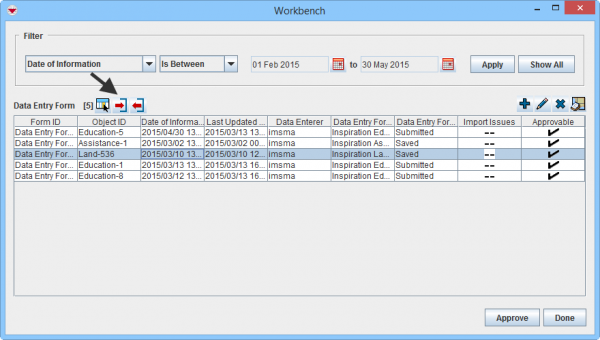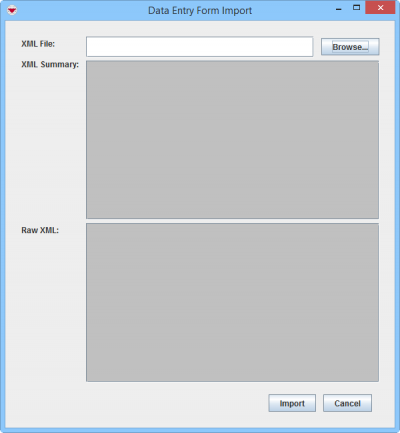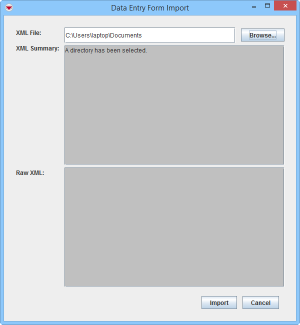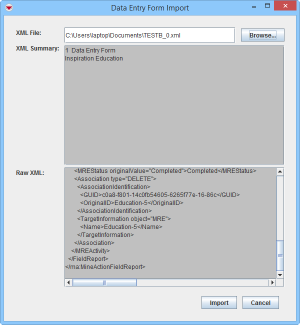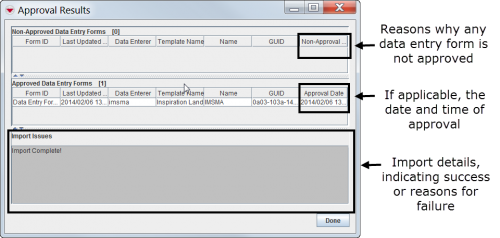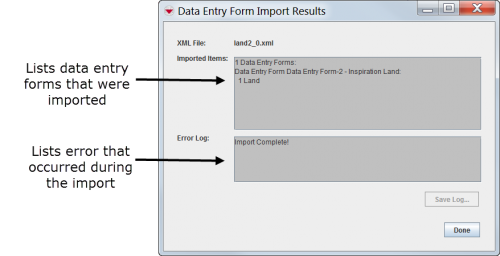Difference between revisions of "Import a Data Entry Form from a xml File"
| (15 intermediate revisions by 3 users not shown) | |||
| Line 1: | Line 1: | ||
| − | + | The import feature allows you to import Data Entry Forms from one computer/database to another computer/database. | |
| − | <ol> | + | |
| − | <li>From the Workbench window, click the [[Image: | + | {{note| Before you import Data Entry Forms, ensure that: |
| − | + | * Custom Defined Fields and option selection values are the same in the exporting and importing databases | |
| − | <li>Click the '''Browse''' button.</li> | + | * the Data Entry Form template name need to be published and active in the importing database |
| − | + | * Auxiliary data used must also exist in the importing database with the same GUIDs. }} | |
| − | <li> | + | |
| + | {{Warning | Data will '''only''' be imported for attributes present on the Data Entry Form template in the importing computer/database. For example, if the Data Entry Form(s) that was exported used a template with 50 attributes, but the receiving-end template only contains 20 of the 50 attributes, data will only be imported for these 20 attributes.}} | ||
| + | |||
| + | The import Data Entry Form(s) from xml file(s) function is started from the [[Access and Use the Workbench Window|Workbench]]. | ||
| + | <ol><li>From the Workbench window, click the [[Image:Import.png | Import]] button. | ||
| + | [[Image:WB Import xml.png|600px|center]] | ||
| + | <div align="center"> '' Workbench window''</div></li> | ||
| + | <li>The Data Entry Form Import window displays.</li> | ||
| + | <li>Click the '''Browse''' button. | ||
| + | [[Image:WB Import xml2.png|400px|center]] | ||
| + | <div align="center"> '' Data Entry Form Import window''</div></li> | ||
| + | <li>The Open window displays.</li> | ||
| + | <li>Use one of the two import xml methods: | ||
<ol type="a"> | <ol type="a"> | ||
| − | <li> | + | <li>select a folder which will import '''all''' xml files in the folder</li> |
| − | <li> | + | <li>select an xml file.</li> |
| + | </ol> | ||
<li>Click the '''Open''' button.</li> | <li>Click the '''Open''' button.</li> | ||
| − | + | <li>The Data Entry Form Import window is updated.</li> | |
| + | <ol type="a"> | ||
| + | <li>If the import folder method is used, XML Summary section of the window is filled with ''A directory has been selected''</li> | ||
| + | <li>If the import file method is used, the number of data entry forms and the number of objects associated with the reports are displayed in the XML Summary section of the window. The contents of the file are displayed in the Raw XML View section. | ||
| + | <center> | ||
| + | {| | ||
| + | |- valign="top" | ||
| + | | | ||
| + | [[Image:WB Import xml4.png|300px]] | ||
| + | [[Image:WB Import xml3.png|300px]] | ||
| + | | | ||
| + | |} | ||
| + | </center></li> | ||
</ol> | </ol> | ||
| − | |||
| − | |||
| − | |||
| − | |||
| − | |||
| − | |||
<li>Click the '''Import''' button.</li> | <li>Click the '''Import''' button.</li> | ||
| − | + | <li>The Data Entry Form Import Options window displays. | |
| − | + | [[Image:FieldReportImportOptions2.png|500px|center|''Data Entry Form Import Options window'']] | |
| − | [[Image:FieldReportImportOptions2.png|center|''Data Entry Form Import Options window'']] | ||
<div align="center"> | <div align="center"> | ||
''Data Entry Form Import Options window'' | ''Data Entry Form Import Options window'' | ||
| − | </div> | + | </div></li> |
| − | + | <li>Select one of the options listed in the following table. | |
| − | <li> | ||
| − | |||
| − | |||
| − | |||
<center> | <center> | ||
| − | {| class="wikitable" width=" | + | {| class="wikitable" width="900" |
|- | |- | ||
| − | | align="center" colspan="2" | ''' | + | | align="center" colspan="2" | '''Description of Import Options''' |
|- | |- | ||
| − | | width=" | + | | width="150pt" | '''If you choose to…''' |
| − | | width=" | + | | width="750pt" | '''The data entry forms...''' |
|- | |- | ||
| − | | Approve all data entry forms || | + | | Approve all data entry forms || The Data Entry Forms will be imported with the current user as ''Approver'' and current date as ''Approved date''. |
| − | + | Data Entry Forms with no import errors and complete reconciliation are imported and marked as ''Approved''. | |
| + | Data Entry Forms with import errors and/or incomplete reconciliation are imported, marked as ''Saved'', and added to the Workbench. | ||
|- | |- | ||
| − | | Use approval data in the Data Entry Forms || | + | | Use approval data in the Data Entry Forms || The Data Entry forms will be imported with the ''Approver'' and ''Approved date'' as specified in the Data Entry Forms. |
| − | + | Data Entry Forms that have been previously approved are imported and marked as ''Approved''. | |
| + | Data Entry Forms that have not been approved are imported, marked as ''Saved'', and are added to the Workbench. | ||
|- | |- | ||
| − | | Import only || | + | | Import only || Data Entry Forms are imported, marked as ''Saved'', and added to the Workbench. |
|} | |} | ||
| − | </center> | + | </center></li> |
| + | <li>Click the '''OK''' button.</li> | ||
| + | <li>The Information window displays a message stating that the data entry form import is complete.</li> | ||
| + | <li>Click the '''Done''' button.</li></ol> | ||
| − | + | === Option 1 and 2===__NOEDITSECTION__ | |
| − | + | If you chose the '''Approve all data entry forms''' option or the '''Use approval data in the Data Entry Forms''' option, the Approval Results window displays. | |
| − | |||
| − | |||
| − | |||
| − | |||
[[Image:ApprovalResults.png|center|500px|''Approval Results Window'']] | [[Image:ApprovalResults.png|center|500px|''Approval Results Window'']] | ||
| Line 60: | Line 75: | ||
</div> | </div> | ||
| − | + | Data entry forms that were approved appear in the Approved Data Entry Forms section of the Approval Results window. The Approval Date column lists the date and time the reports were approved. | |
| − | + | Reports that were not approved appear in the Non-Approved Data Entry Forms section. The Non-Approval column lists the reasons they were not approved. Possible reasons include ''Reconciliation Incomplete'', ''Import Error'', and ''Unknown Error''. | |
| − | |||
<ol type="a"> | <ol type="a"> | ||
<li>Click the '''Done''' button.</li> | <li>Click the '''Done''' button.</li> | ||
<li>If a data entry form was not approved, open the Workbench window and double-click the row associated with the unapproved data entry form.</li> | <li>If a data entry form was not approved, open the Workbench window and double-click the row associated with the unapproved data entry form.</li> | ||
| − | + | <li>The Data Entry Form Editor window displays.</li> | |
| − | <li>Resolve the error on the Reconciliation tab if applicable. See the ''Data Entry Forms – [[ | + | <li>Resolve the error on the Reconciliation tab if applicable. See the ''Data Entry Forms – [[Reconcile]]'' section for additional information.</li> |
<li>Resolve the error on the Import Issues tab if applicable. When complete, check the '''All Import Issues have been resolved''' checkbox.</li> | <li>Resolve the error on the Import Issues tab if applicable. When complete, check the '''All Import Issues have been resolved''' checkbox.</li> | ||
<li>Click the '''Approve''' button.</li> | <li>Click the '''Approve''' button.</li> | ||
| − | + | <li>The Information window displays confirming the data entry form was approved.</li> | |
| − | |||
| − | |||
| − | |||
| − | |||
| − | |||
</ol> | </ol> | ||
| − | [[Image: | + | === Option 3===__NOEDITSECTION__ |
| + | If you chose the '''Import Only''' option, the Data Entry Form Import Results window displays. | ||
| + | [[Image:FieldReportImportResultsWindow.png|center|500px|''Data Entry Form Import Results Window'']] | ||
<div align="center"> | <div align="center"> | ||
''Data Entry Form Import Results Window'' | ''Data Entry Form Import Results Window'' | ||
</div> | </div> | ||
| − | + | The Imported Items section of the window lists the items that were imported. Any errors that occurred during the import are noted in the Error Log section of the window. You can save the error log to a file by clicking the Save Log button. You can also view import errors on the Import Issues tab of the Data Entry Form Editor window. | |
| − | <ol | + | <ol type="a"> |
<li>Click the '''Done''' button.</li> | <li>Click the '''Done''' button.</li> | ||
| − | + | <li>The imported Data Entry Forms will be listed in the Workbench. You will need to reconcile the item records in the Data Entry Forms. </li></ol> | |
| − | </ol> | + | |
{{NavBox HowTo Field Reports}} | {{NavBox HowTo Field Reports}} | ||
| + | |||
| + | [[Category:NAA]] | ||
Latest revision as of 09:39, 29 May 2017
The import feature allows you to import Data Entry Forms from one computer/database to another computer/database.
The import Data Entry Form(s) from xml file(s) function is started from the Workbench.
- From the Workbench window, click the
 button.
Workbench window
button.
Workbench window - The Data Entry Form Import window displays.
- Click the Browse button.
Data Entry Form Import window
- The Open window displays.
- Use one of the two import xml methods:
- select a folder which will import all xml files in the folder
- select an xml file.
- Click the Open button.
- The Data Entry Form Import window is updated.
- If the import folder method is used, XML Summary section of the window is filled with A directory has been selected
- If the import file method is used, the number of data entry forms and the number of objects associated with the reports are displayed in the XML Summary section of the window. The contents of the file are displayed in the Raw XML View section.
- Click the Import button.
- The Data Entry Form Import Options window displays.
Data Entry Form Import Options window
- Select one of the options listed in the following table.
Description of Import Options If you choose to… The data entry forms... Approve all data entry forms The Data Entry Forms will be imported with the current user as Approver and current date as Approved date. Data Entry Forms with no import errors and complete reconciliation are imported and marked as Approved. Data Entry Forms with import errors and/or incomplete reconciliation are imported, marked as Saved, and added to the Workbench.
Use approval data in the Data Entry Forms The Data Entry forms will be imported with the Approver and Approved date as specified in the Data Entry Forms. Data Entry Forms that have been previously approved are imported and marked as Approved. Data Entry Forms that have not been approved are imported, marked as Saved, and are added to the Workbench.
Import only Data Entry Forms are imported, marked as Saved, and added to the Workbench. - Click the OK button.
- The Information window displays a message stating that the data entry form import is complete.
- Click the Done button.
Option 1 and 2
If you chose the Approve all data entry forms option or the Use approval data in the Data Entry Forms option, the Approval Results window displays.
Approval Results Window
Data entry forms that were approved appear in the Approved Data Entry Forms section of the Approval Results window. The Approval Date column lists the date and time the reports were approved. Reports that were not approved appear in the Non-Approved Data Entry Forms section. The Non-Approval column lists the reasons they were not approved. Possible reasons include Reconciliation Incomplete, Import Error, and Unknown Error.
- Click the Done button.
- If a data entry form was not approved, open the Workbench window and double-click the row associated with the unapproved data entry form.
- The Data Entry Form Editor window displays.
- Resolve the error on the Reconciliation tab if applicable. See the Data Entry Forms – Reconcile section for additional information.
- Resolve the error on the Import Issues tab if applicable. When complete, check the All Import Issues have been resolved checkbox.
- Click the Approve button.
- The Information window displays confirming the data entry form was approved.
Option 3
If you chose the Import Only option, the Data Entry Form Import Results window displays.
Data Entry Form Import Results Window
The Imported Items section of the window lists the items that were imported. Any errors that occurred during the import are noted in the Error Log section of the window. You can save the error log to a file by clicking the Save Log button. You can also view import errors on the Import Issues tab of the Data Entry Form Editor window.
- Click the Done button.
- The imported Data Entry Forms will be listed in the Workbench. You will need to reconcile the item records in the Data Entry Forms.
| |||||
